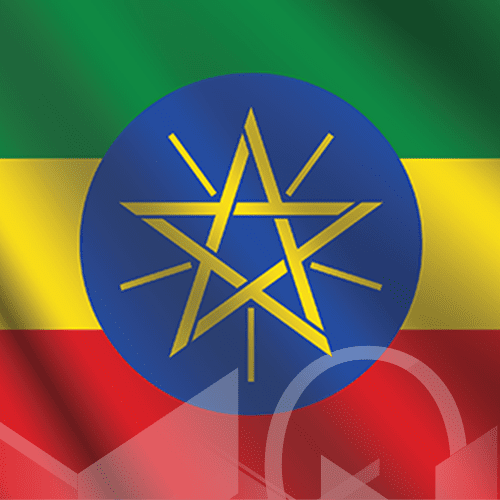
Filter
Sample Reports
Related Links
Ethiopia
The Federal Democratic Republic of Ethiopia is a landlocked country covering 1,126,829km2 and is located on the Horn of Africa. Under Ethiopia’s constitution, all Ethiopian languages enjoy official state recognition which include Amharic, Afan Oromo, Afar, Somali and Tigrigna, while English is widely spoken. It has a population of 132.1m people, which is expected to rise to 140m by 2030 and a GDP of US$117.6bn which is expected to grow by 6.6% in 2025. It is bounded by Eritrea to the north, Djibouti to the northeast, Somalia to the east, Kenya to the south, and South Sudan and Sudan to the west.
The local currency is the Ethiopian Birr.
Its economy is the 5th largest in Africa, services account for 40% of GDP, industry 28% and agriculture 32%. The consistently high economic growth over the last decade resulted in positive trends in poverty reduction in both urban and rural areas. However, it also remains one of the poorest, with a per capita gross national income of $1,020.
Ethiopia is a federation comprising two self-governing administrations – the cities of Addis Ababa (the capital) and Dire Dawa – and 10 regional states, which are largely ethnically based. Measured by land area, the largest region in Ethiopia is Oromia (Oromiya), which covers 284,538km². With a surface area of only 527km², Addis Ababa, called a “chartered city”, has the status of a city and a region and is the country’s smallest region. Dire Dawa, which means place of remedy, is also a chartered city divided into two woredas: the city proper; and the non-urban woreda of Gurgura.
The government has launched a 10-Year Development Plan, based on its 2019 Home-Grown Economic Reform Agenda, which runs from 2020/21 to 2029/30. The plan prioritises infrastructure development including roads, railway, irrigation systems, housing and industrial parks. The plan aims to sustain the high growth achieved under the Growth and Transformation Plans of the previous decade while facilitating the shift towards a more private-sector-driven economy.
The involvement of foreign companies is dominated by Chinese companies, which are undertaking large projects. The construction market in Ethiopia was valued at US$41bn in revenue in 2021 and is projected to grow at an annual average growth rate of more than 8% from 2023 to 2026. The Ten Years Development Plan touches all aspects of development, including infrastructure development, and includes the objective of public-private partnerships. It has an enabling policy environment and competitive incentive packages for investors, including 100% exemption from payment of custom duty on imported capital goods, such as plant, machinery and equipment and construction material.
As a landlocked country, Ethiopia relies heavily on the port of neighbouring Djibouti for the import and export of goods. Port Sudan in neighbouring Sudan and Port Berbera in neighbouring Somalia are used to a lesser degree. In 2018, Ethiopia concluded an agreement with the Somaliland Ports Authority to acquire 19% stake in a joint venture developing the port of Berbera. Ethiopia has built seven inland ports in Modjo, Kallity, Semera, Mekelle, Dire Dawa, Gelan and Kombolcha with an installed handling capacity of 22,000 containers. The dry port of Modjo approximately 70km from Addis Ababa is connected to the Ethio- Djibouti Railway and handles more than 78% of Ethiopia’s imports, according to Ethiopian Shipping & Logistics Services Enterprise (ESLSE). Most imports of construction materials are routed to Addis Ababa and then despatched to various inland ports. Most goods are transported by truck. The railway system that connects Djibouti port to Addis Ababa has capacity to move 3,500t of goods per single trip. The Addis Ababa Bole International Airport is the major gateway for all shipments by air.
Internet penetration in Ethiopia is estimated to amount to 27.02% in 2025.
Ethiopian Airlines was established in 1946 and has grown to the largest airline in Africa with a fleet of approximately 150 it has become the de facto aviation hub of East Africa.
Installed generation capacity in Ethiopia stands at 4,206MW and several power projects still to be completed include Gilgel Gibe IV hydroelectric, expected to generate 2,160MW 2022 and The Grand Ethiopia Renaissance Dam, with a projected installed capacity of 5,600MW. Ethiopia has abundant renewable energy resources and has the potential to generate over 60,000 megawatts (MW) of electric power from hydroelectric, wind, solar, and geothermal sources. Additionally, in 2022 the GOE certified the presence of seven trillion cubic feet of natural gas reserves in the Ogaden Basin.
Ethiopia’s main exports are gold (21% of total exports) and coffee (19%), and other exports include live animals, oilseeds and flowers.
Sources: Who Owns Whom sector reports, CIA Factbook, African Development Bank, World Bank, Trading Economics, African Statistical Yearbook and IMF. ?>
Company Profile
There is no data available at the moment
Sector Research
| CompanyName | Stock Exchange | Listed Date | Ticker Code | Country | Status |
|---|---|---|---|---|---|
| ETHIO TELECOM SHARE COMPANY | Ethiopian Securities Exchange | 2025-06-25 | TELE | Ethiopia | Active |
| GADAA BANK S.C. | Ethiopian Securities Exchange | 2025-06-13 | GDAB | Ethiopia | Active |
| WEGAGEN BANK S.C. | Ethiopian Securities Exchange | 2025-01-10 | WGBX | Ethiopia | Active |
The Agri-Business Sector in Ethiopia
Full Report R 20 000.00(ZAR) estimated $ 1231.24 (USD)*
Industry Landscape R 14 000.00(ZAR) estimated $ 861.87 (USD)*
The Construction Industry in Ethiopia
Full Report R 1 900.00(ZAR) estimated $ 116.97 (USD)*
Industry Landscape R 1 330.00(ZAR) estimated $ 81.88 (USD)*
ICT and Telecommunications in Ethiopia
Full Report R 1 900.00(ZAR) estimated $ 116.97 (USD)*
Industry Landscape R 1 330.00(ZAR) estimated $ 81.88 (USD)*
The Agri-Business Sector in Ethiopia
Full Report R 1 900.00(ZAR) estimated $ 116.97 (USD)*
Industry Landscape R 1 330.00(ZAR) estimated $ 81.88 (USD)*
ICT and Telecommunications in Ethiopia
Full Report R 1 900.00(ZAR) estimated $ 116.97 (USD)*
Industry Landscape R 1 330.00(ZAR) estimated $ 81.88 (USD)*


